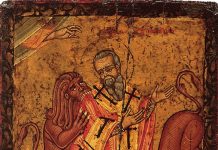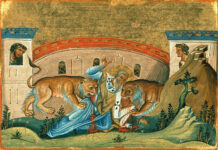Saint Januarius was bishop of Benevuento, in the south-west of Italy, about whom a number of legends are told – that he survived unscathed being burnt in a furnace, that wild bears refused to touch him in the amphitheatre – but all we know for relative certainty is that he was put to death in the last, great persecution of Diocletian, sometime around 305 A.D., a decade or so before Christianity was legalized under Constantine.
What makes him more famous is the ampule of his blood kept under lock and key in the cathedral safe, which liquefies two or three times a year, for reasons that are unclear. Oft-times, the blood will liquefy in the presence of a Pope, but did not for John Paul II nor Benedict XVI, and only half-liquefied for Francis. Make of that what you will. Perhaps it’s not connected to Popes after all. One early hypothesis was that the blood liquefied when Januarius’ skull was brought near, signifying the blood’s ‘desire’ to be reunited with the body, in anticipation of the resurrection, of which Saint Paul speaks in today’s readings.
What we do know, as an article just today on CNA declares, is that the liquefaction of St. Januarius’ blood happens at least three times per year: the saint’s feast day of Sept. 19, the Saturday before the first Sunday of May, and Dec. 16, which is the anniversary of the 1631 eruption of Mount Vesuvius.
And what of the vial of blood remaining dried and clotted? Well, as the report goes on, the failure of the blood to liquefy is believed to signal war, famine, disease, or other disaster.
As Cardinal Crescenzio Sepe, Archbishop of Naples, says that the miracle is a sign of God’s love, goodness, and mercy, and of the closeness, the friendship, the fraternity of our St. Januarius…Glory be to God and veneration to our saint. Amen.
Although Christ warned us not to pay too much attention to signs, to set readers’ mind at some degree of rest, when the good Archbishop celebrated Mass on the saint’s feast today, at 10:02 a.m., Italian time, the blood of the martyr liquefied.
Glory be to God, and all His saints, indeed.











